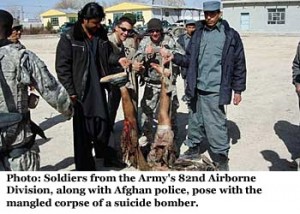Obama’s new initiative to sanction private companies that help undemocratic regimes repress their people should not be construed as an act against repression per se. Just the kind Washington isn’t complicit in.
The Washington Post explains “[t]he new steps are designed primarily to target companies explicitly aiding authoritarian governments with new technology that assists in civilian repression,” but the administration will “not identify the targets of the sanctions by name” but “said ‘entities’ in this case describes both government agencies and private companies in Iran and Syria.”
Former Secretary of State Madeleine Albright and former Secretary of Defense wrote a conspicuously timed piece for Foreign Policy today on the administration’s new initiative. They argue unconvincingly that this “is a clear-eyed and pragmatic attempt to expand our government’s tool box to meet the challenges posed by tyrants who pose an extraordinary threat to their civilian populations.”
First of all, I long ago declared eternal hostility towards anything that “expands the government’s tool box” or its bank account or its bathing-suit areas or whatever else it wants to expand. But the larger point is that it is clear this initiative is just a reiteration of the hypercritical approach to tyranny Washington has displayed for decades. These measures, I’m sure, won’t target the private U.S. firms providing security assistance to repressive regimes that happen to be allied with the U.S.
Bahrain has been tapping the expertise of ex-U.S. police chief John Timoney to crack down more efficiently on peaceful protesters as well as a UK cop John Yates who apparently specializes in illegal wire-tapping and police surveillance. Before the NATO-backed regime change in Libya, Muammar Gadhafi was a friend and ally of Washington and paid millions to U.S. firms to churn out propaganda for him, and now various public relations firms are doing the same for the terrible governors we’ve replaced him with.
Security ties such as this are by no means uncommon in the region, though the focus is usually focused on counterterrorism rather than public demonstrations. The Monitor Group, a Massachusetts-based lobbying firm, helped Muatassim al-Qadhafi train and staff his proposed National Security Council before the Libya uprising curtailed its creation. The New York Times reported last May that Erik Prince, former Blackwater chief, was building up a mercenary army in the UAE on the Crown Prince’s dirham. Israel and the US often share counterterrorism techniques and trainings. The US has been involved in past Bahraini police trainings, as have trainers from the UK: “British police have helped to train their counterparts in Bahrain, Libya, Abu Dhabi, Qatar and Saudi Arabia,” The Independent reported. The Saudi National Guard, which was deployed in force to Bahrain last spring, also received UK training. Military and intelligence training for security forces is also common – Iraq, of course, is the most notable Middle Eastern example of such a (multinational) effort, but the US has also funded and trained Lebanese, Egyptian, Saudi Arabian, and West Bank Palestinian security forces.
How many governments around the world receive the help of Washington and of private U.S. firms in repressing their own people? How many will be susceptible to the punitive measures in this new initiative? Heck, while we’re at it, will AT&T be targeted for sanctions? After all, they were collaborators in what former NSA official William Binney called the “direct violation of the constitutional rights of everybody in the country.” What about the private companies with ties to Israel that wiretapped Americans for the NSA, a story revealed by James Bamford in Wired Magazine recently? How many private contracting firms are at the disposal of the NSA’s forthcoming spy center?
As usual, Washington’s intentions have nothing to do with protecting civilian populations from repressive regimes. This initiative is just another device to target states that Washington already doesn’t like.







